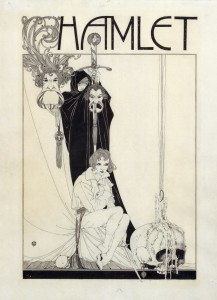“This above all: to thine own self be true,
And it must follow, as the night the day,
Thou cans’t not be false to any man “
Hamlet Act 1 Sc 3
A father’s wisdom
These words have rightly become much quoted for they are full of wisdom. They are, of course, the words spoken by Polonius to his son Laertes before Laertes sets out on his travels. We might suggest that a successful life is a life lived according to this principle. The whole play of Hamlet, within which these words are spoken, can be seen as revolving around this challenge to be true to yourself. The play only comes to its resolution when Hamlet, who has contemplated suicide as a way out of his dilemmas, finally decides to act. He dies at the hand of his one time friend, Laertes, but not before he has taken the life of his uncle, the murderer of his own father.

Hamlet
(c) John Austen. – Folger Digital Image Collection
The Soul’s Code
In his intriguing, and readable book, The Soul’s Code, James Hillman suggests that the real destiny and purpose of an individual often shows up in their wishes and desires in childhood. He quotes the story of Judy Garland, the mother of Liza Minnelli, who apparently at a very young age was taken to see a variety show at the theatre. She declared to her parents that that (pointing to the stage) was what she wanted to do. At this stage in her career she was known as Baby Gumm (Gumm being her family name) and aged two and a half, she is reputed to have charmed her family and friends with various renditions of Jingle Bells! She took the name Judy some years later.
Hillman uses this and other examples (Yehudi Menuhin the famous violinist being another) to illustrate the idea that for some individuals their destiny seems engraved in their very being even in their childhood. Menuhin played Mendelssohn’s Violin Concerto aged seven, and did it so well that his fame was assured. He went on to become one of the world’s most famous and accomplished violin players. For Judy Garland it would have been inconceivable not to entertain. For Yehudi Menuhin it would have been impossible not to be a violinist. It would have been doing violence to their souls to prevent them following their inborn destiny.
Abel Gantz made a wonderful film in the early part of last century, called Napoleon. The film lasts many hours and only covers the early part of Napoleon’s life, up until the time he successfully led the small French army into Italy, where he overcame all opposition. In the very early part of this monumental film, Gantz depicts Napoleon at school. There is snow all around, and the schoolboys are indulging in a mammoth snowball fight. The group Napoleon is with are outnumbered by a group of older boys. The diminutive Napoleon leads his fellow school chums in the charge against the substantial opposition. He commands from the front. Even though it is not a matter of life and death, he shows considerable courage. In this scene, the director establishes that Napoleon has strategic understanding, flair and a gift for leadership.

Napoleon – from the film by Abel Gance
With Judy Garland, there was no question that she would be an entertainer. It was inconceivable that Yehudi Menuhin would not take up the violin professionally. That always appeared to be his destiny. Of course, some of the qualities that made Judy Garland and excellent performer, were also challenges in her life; a life that in some senses was quite tragic. The extra-ordinary qualities that took Napoleon from a modest middle-class background in the obscure French island of Corsica, to the emperor’s throne in Paris, also contained the seeds of his own destruction.
These inner yearnings, and urges, that make us what we are, do not just apply to the famous and the infamous; they apply to us all. In some psychological approaches these inner drives are called Qualities. Perhaps at the level of the Soul we potentially embrace all Qualities. However, in our everyday existence most people appear to have two or three specific Qualities that seem to define their uniqueness. It is to these qualities that we are to be “true”, if our life is to be experienced interiorly as a success.
The red thread
In Scandinavia they talk about “the red thread”. This is the tendency or pattern that runs through things. We can spot the red thread in our own lives when we look back over time. When we reflect on what gave us most joy, where and when we felt most alive, those points at which we seemed to be fulfilling our destiny, we discover where it is we are most ourselves.
Sometimes, we find that the activities that enliven us have been left behind, and we have instead filled our life with the humdrum and the mundane. Something appears to be missing. Perhaps, we conclude, that we are not “being true to ourselves”. This question has been explored in an intriguing way by a Dutch psychologist called Daniel Ofman.
Core Qualities and Pitfalls
Daniel developed the idea of Core Qualities. He does not have a questionnaire or a simple test to establish what an individual’s qualities are. Rather, you ask yourself the question “what is it that others appreciate it me?”, “what is it that I take from granted in myself?” You find a quality that has always been true for you. Examples might be, enthusiasm, depth, perseverance, initiative, tenacity, tactfulness and so forth. No one can really find the right word for you, but you know it when you find it.
What is intriguing is what Daniel does next. He suggests that when we take our particular Quality to an extreme, then it becomes our “Pitfall”. This is the behaviour that we will tend to justify in ourselves, and we will overlook when we see it in others. However, those on the receiving end will tend to find this behaviour difficult. Someone with a core quality of decisiveness might have the pitfall pushiness. The quality modesty could lead to the downside of passiveness.
When we have established one of our Core Qualities and its Pitfall, we can find the balancing factor which Daniel calls our Challenge. This is the positive opposite of our Pitfall. The pushy person might need to develop patience. For the passive person the challenge might be initiative.
The final step in Daniel’s approach is revealing. When our Challenge is taken to an extreme, then we discover our Allergy. Patience, when it is overdone becomes passivity; this is anathema to the decisive person. The challenge of initiative when amplified may become aggressiveness; for the modest person this can be very difficult to deal with. We can see in this example that when a decisive person and a modest person meet, allergy of the first may be the pitfall of the second. The challenge for the decisive person is to deal with the passiveness that is the pitfall of the modest person.
Being true to ourselves, does not have to be life-threatening as it proved for both Hamlet and Laertes. However, if we are not true to ourselves, then the life we lead is a life not worth leading.


Leave a Reply